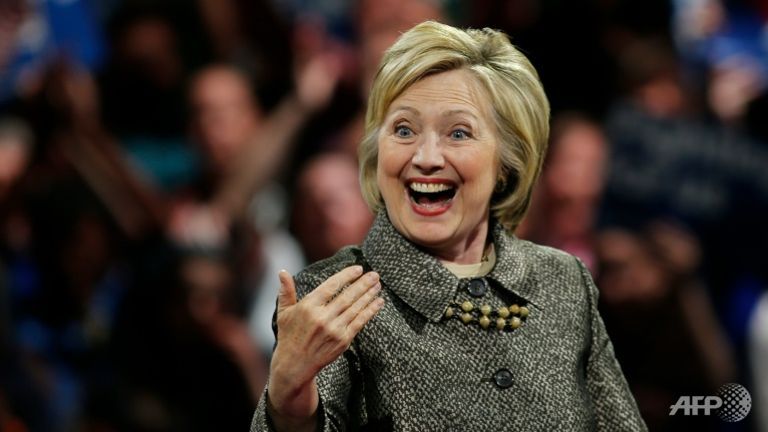Trump, Hillary clash in shifting White House race
 |
| Democratic presidential candidate Hillary Clinton addresses supporters during a primary night event in Philadelphia after winning the Pennsilvania state primary. (AFP/Eduardo Munoz Alvarez) |
WASHINGTON: Republican Donald Trump trained his fire on Hillary Clinton on Wednesday (Apr 27), accusing his Democratic rival of playing "the woman card" in her White House bid, after both took a giant step towards clinching their parties' nominations.
Clinton and Trump crushed their rivals in Tuesday's latest round of primaries, leaving the former secretary of state virtually assured of the Democratic nomination and Trump in an ever more dominant position in the Republican race.
Despite unfinished business in the primary contests, both candidates turned their sights to November's general election with Trump dismissing Clinton's credentials in a frontal attack.
"Frankly, if Hillary Clinton were a man, I don't think she'd get five per cent of the vote," he told supporters at a victory press conference. "The only thing she's got going is the woman's card."
The billionaire real estate developer doubled down on Wednesday on CNN, goading: "She's playing the woman card left and right... she will be called on it. Absolutely."
It wasn't the first time Trump had goaded Clinton with the accusation, and she took up the gauntlet in a victory speech late Tuesday in Philadelphia. "Well, if fighting for women's health care and paid family leave and equal pay is playing the woman's card, then deal me in," she said.
If Clinton wins the presidential nomination, she would be the first woman of either party to do so.
Though longtime frontrunners, both candidates until now have been more preoccupied fighting off rivals for their parties' nomination than with each other.
But with the latest primary results, the curtain is lifting on what promises to be a fierce Clinton-Trump general election battle.
"I'm not going to be changing. I'm presidential anyway," Trump told CNN, assuring there will be no makeover of his mocking, insult-laden campaign style.
As Trump prepared to deliver a major speech in Washington outlining his foreign policy, the Clinton campaign pre-empted it by highlighting his many controversial proposals - a ban on Muslims, bringing back torture, and encouragement for a nuclear armed Japan and South Korea, among others.
"As Hillary Clinton has said, loose cannons tend to misfire," her campaign said.
STUBBORN RIVALS
Both candidates, meanwhile, must still contend with stubborn rivals intent on tripping them up before their parties' nominating conventions in July.
Trump's closest challenger, Texas Senator Ted Cruz, summoned media following him on the campaign trail in Indiana for what he promised would be "a major announcement" on Wednesday at 4.00pm (2000 GMT).
He was widely expected to reveal his pick of running mate, with former White House contender Carly Fiorina tipped as a likely choice.
Cruz has teamed up with Ohio Governor John Kasich to try to block Trump's path, and wrest the nomination from him at the Republican convention in Cleveland.
Trump is still short of the 1,237 delegates needed to win the nomination outright, but his blowout wins Tuesday in Connecticut, Delaware, Maryland, Pennsylvania and Rhode Island give him momentum going forward.
"I consider myself the presumptive nominee," he told a crowd at Trump Tower in New York. "As far as I'm concerned, it's over."
A key test of the "stop Trump" strategy will come in the Indiana primary on May 3.
Kasich has agreed not to campaign there, giving Cruz an opportunity to compete head to head with Trump for the state's 57 delegates. Cruz has agreed not to compete with Kasich in New Mexico and Oregon.
Trump now stands at 988 delegates, according to CNN's running estimate. Cruz was a distant second with 568, while Kasich increased his numbers only slightly, to 152.
PARTY UNITY
Clinton's problem will be to mend the sharp divisions opened during her contest with Bernie Sanders, a self-proclaimed democratic socialist with an ardent following among young, independent and white blue-collar voters.
The former secretary of state won four out of five primaries on Tuesday, taking Connecticut, Delaware, Maryland and the night's big prize, the battleground state of Pennsylvania. She conceded only the small state of Rhode Island to Sanders.
"What a great night," Clinton told a thrilled crowd of supporters in Philadelphia. "Let's go forward, let's win the nomination, and in July let's return as a unified party," she said.
The Vermont senator, however, has refused to concede the race, vowing to take his campaign to the Democratic convention "with as many delegates as possible to fight for a progressive party platform."
"The people in every state in this country should have the right to determine who they want as president and what the agenda of the Democratic Party should be. That's why we are in this race until the last vote is cast," Sanders said in a statement.
Clinton needs 2,383 delegates to win the nomination, and now has 2,168 delegates, including more than 500 "super-delegates," against Sanders's 1,401. Fourteen nominating races remain, with about 1,000 more delegates to be distributed.
What the stars mean:
★ Poor ★ ★ Promising ★★★ Good ★★★★ Very good ★★★★★ Exceptional
Latest News
More News
- Thailand tightens security following violent attacks in deep south (March 11, 2025 | 14:52)
- ASEAN states unite for future economic stability (March 06, 2025 | 10:41)
- Indonesia plans over 20 energy projects in 2025 (March 05, 2025 | 10:09)
- Bali to use “water taxi” to address traffic congestion (March 04, 2025 | 17:15)
- RoK, Thailand hold 4th round of economic partnership negotiations (March 04, 2025 | 16:48)
- Thailand busts illegal e-money firms (March 03, 2025 | 16:47)
- Thailand to repatriate thousands of scam centre workers from Myanmar (March 03, 2025 | 10:51)
- PM stresses need for ASEAN to embrace new technologies (February 26, 2025 | 17:30)
- The world's future belongs to the youth: PM (February 26, 2025 | 17:23)
- More than 200 foreigners rescued from Cambodian scam centre (February 25, 2025 | 16:06)




















 Mobile Version
Mobile Version